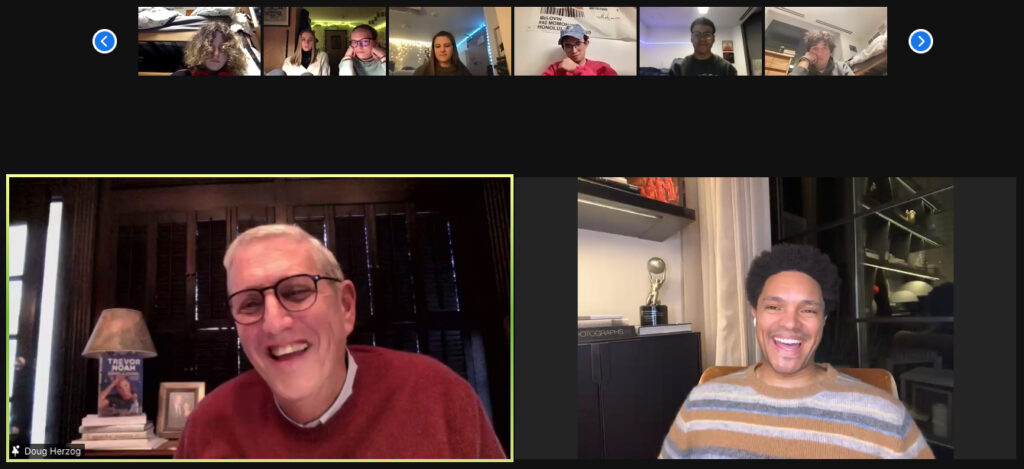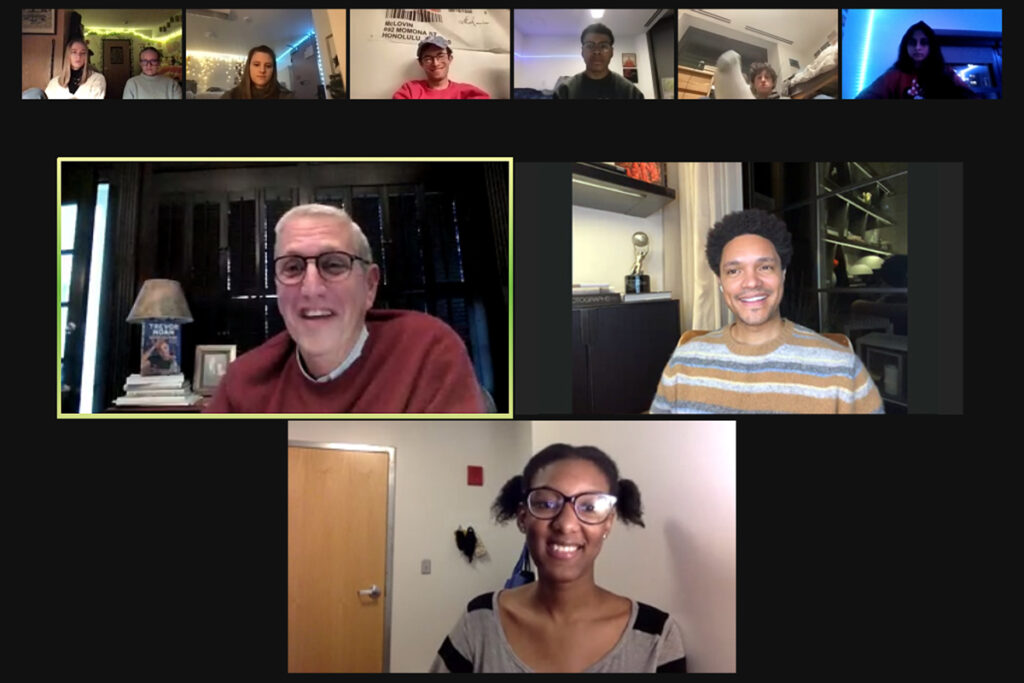Trevor Noah Talks Comedy, Journey with Trustee Doug Herzog ’81

Stand-up comedy was not part of Trevor Noah’s culture while growing up in Johannesburg, South Africa during apartheid. Instead, The Daily Show host’s introduction to comedy was through American sitcoms like Family Matters and The Golden Girls, as well as video clip and hidden camera series like America’s Funniest Home Videos and Candid Camera.
That was one of the tidbits Noah revealed during an hour-long, in-depth conversation with legendary comedy executive and Emerson Trustee Doug Herzog ’81 on Wednesday, November 17. The virtual event was part of the series All Joking Aside with Doug Herzog, which is produced by the Center for Comedic Arts at Emerson College and Emerson Los Angeles. The series provides viewers with an exclusive, behind the scenes look at the comedy business.
Read: Discussing the Serious Business of Comedy with Doug Herzog ‘81
Noah says that when he first stepped onto the stage, he just talked to people. To this day, he still tries to create comedy like that.
“I don’t like to think of it in too much of a formulaic fashion,” said Noah, who considers himself a storyteller. “If you grew up in Africa and you can’t tell stories, then you don’t serve a purpose in society. Everyone has to tell a story.”
After watching a group of Canadians perform a sketch stand-up show, Noah says he felt like he could do comedy, which was still a niche industry during the early days of South Africa’s post-apartheid democracy. Eventually, he connected with the right people and found his way onto a stage. After performing his first show, Noah knew it was what he wanted to do with his life. His comedy took him around South Africa, to neighboring countries, the UK, and eventually the rest of the world.
“I’m still probably known as the comedian who will perform anywhere at any time,” said Noah, who released his autobiographical comedy book Born a Crime: Stories from a South African Childhood in 2016.

When asked by student Kimberly Ndegwa ’23 about what advice he might have to break into Hollywood, Noah said not to disregard your local industry.
“Try and embrace the place that you are from because what it can do is imbue you with a different level of not just understanding, but a different level of joy,” said Noah. “There is something that comes with performing in a small place, honing your craft in a small place, before you thrust yourself into Hollywood.”
An answer Noah gave to another student’s question about feeling like an outsider resonated with Ndegwa.
“As an African coming to the United States, there’s already a set standard for what people like us are supposed to do and are supposed to act like. When you want to create your own version of yourself, a lot of people turn away from you,” said Ndegwa, who’s originally from Kenya. “When he said that he still considers himself an outsider and that it’s probably not going to change, it’s something I relate to. Not in a pitiful way, but it’s a reality that we acknowledge.”
Another reality Noah and the rest of the world has had to face is COVID. The pandemic enabled Noah to take the longest break he has ever had from performing stand-up, spending some 16 months away from the stage. At first, he enjoyed having weekends and taking a break from the “insane pace” of hosting The Daily Show and performing on the weekends. Then, he started to miss it. He’s back to performing again, though he admits it’s “weird” doing stand-up in a hybrid environment where masks are won by attendees and there isn’t a consistent level of normalcy yet.
The pandemic taught Noah some other lessons as well.
“I’m not afraid of failing in the same way I was before,” Noah told Herzog. “I want to explore… Let’s go and try a few new things.”
It was that same spirit that helped Noah land The Daily Show hosting gig, though he initially turned down appearing on the show as a contributor several times. Noah says he was just busy touring.
“In South Africa, The Daily Show used to air on CNN. I thought that The Daily Show was a CNN show and I thought [former host] Jon Stewart was a news anchor who didn’t take his job seriously at all,” said Noah. “Why would I want to join CNN?”
Stewart repeatedly reached out and one day Noah found himself in New York. He came to the studio, met Stewart on a Monday, and was doing his first piece on air that Thursday. He’d only done a handful of pieces before he was chosen to take over as host for Stewart in 2015, which happened while Herzog was president of Viacom’s Music Entertainment Group, overseeing Comedy Central among other cable channels.
“It is hard work,” Herzog told the audience. “The kind of hours Trevor has to devote… It’s heavy lifting every day.”
When he first discussed taking over the hosting gig with Herzog, Noah wanted to cover more international stories and social issues, though his first few months were spent just trying to stay afloat. Noah admits to being out of his depth when he first started the show, so he spent hours and hours grinding away, learning American civics and politics. The election of Donald Trump felt like recognizable territory for Noah.
“Everything America has gone through in these [last] six years I’m unfortunately all too familiar with,” said Noah. “Where I’m from, this is politics.”
When asked by a student about what tips he would give to aspiring stand-ups Noah listed three things: focus on the funny, do as many shows as you can, and remember that if you don’t find the funny, nobody else will.
Jamie Elder ’25 asked Noah about the difference between writing for late-night and stand-up. Noah says late-night writing comes out immediately and is not as refined as stand-up. It is dictated by events of the day and intended for a general audience.
“Late-night is me processing what is happening in the world,” said Noah. “[Stand-up is] a synthesis of everything happening in my head.”
Leni Paul ’24 wanted to gauge Noah’s thoughts about how comedy has changed over the years. Noah says jumps in technology and the platforms have impacted comedy and what’s popular, sharing examples of comedy on radio versus sitcoms and social media today.
“I don’t think comedy itself fundamentally changes. All we see are different layers and different generations of comedy,” said Noah. “The stand-up itself doesn’t change.”
Elder says she and a few of her friends watched the event together and were excited to hear from Noah.
“The event was awesome to attend,” said Elder, whose hopes to be cast on SNL one day and have a career as a stand-up comedian. “I’ve always loved Trevor and loved the opportunity to meet him.”
Check out other interviews from All Joking Aside With Doug Herzog
Categories